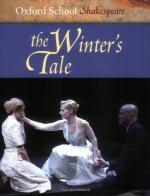Perdita.
Now
Jove afford you cause!
To me the difference forges dread: your greatness
Hath not been us’d to fear. Even now I
tremble
To think your father, by some accident,
Should pass this way, as you did. O, the fates!
How would he look to see his work, so noble,
Vilely bound up? What would he say? Or how
Should I, in these my borrow’d flaunts, behold
The sternness of his presence?
Florizel.
Apprehend
Nothing but jollity. The gods themselves,
Humbling their deities to love, have taken
The shapes of beasts upon them: Jupiter
Became a bull and bellow’d; the green Neptune
A ram and bleated; and the fire-rob’d god,
Golden Apollo, a poor humble swain,
As I seem now:—their transformations
Were never for a piece of beauty rarer,—
Nor in a way so chaste, since my desires
Run not before mine honour, nor my lusts
Burn hotter than my faith.
Perdita.
O,
but, sir,
Your resolution cannot hold when ’tis
Oppos’d, as it must be, by the power of the
king:
One of these two must be necessities,
Which then will speak, that you must change this purpose,
Or I my life.
Florizel.
Thou
dearest Perdita,
With these forc’d thoughts, I pr’ythee,
darken not
The mirth o’ the feast: or I’ll be
thine, my fair,
Or not my father’s; for I cannot be
Mine own, nor anything to any, if
I be not thine: to this I am most constant,
Though destiny say no. Be merry, gentle;
Strangle such thoughts as these with any thing
That you behold the while. Your guests are coming:
Lift up your countenance, as it were the day
Of celebration of that nuptial which
We two have sworn shall come.
Perdita.
O
lady Fortune,
Stand you auspicious!
Florizel.
See,
your guests approach:
Address yourself to entertain them sprightly,
And let’s be red with mirth.
[Enter Shepherd, with Polixenes and Camillo, disguised; clown, Mopsa, Dorcas, with others.]
Shepherd.
Fie, daughter! When my old wife liv’d,
upon
This day she was both pantler, butler, cook;
Both dame and servant; welcom’d all; serv’d
all;
Would sing her song and dance her turn; now here
At upper end o’ the table, now i’ the
middle;
On his shoulder, and his; her face o’ fire
With labour, and the thing she took to quench it
She would to each one sip. You are retir’d,
As if you were a feasted one, and not
The hostess of the meeting: pray you, bid
These unknown friends to us welcome, for it is
A way to make us better friends, more known.
Come, quench your blushes, and present yourself
That which you are, mistress o’ the feast:
come on,
And bid us welcome to your sheep-shearing,
As your good flock shall prosper.




